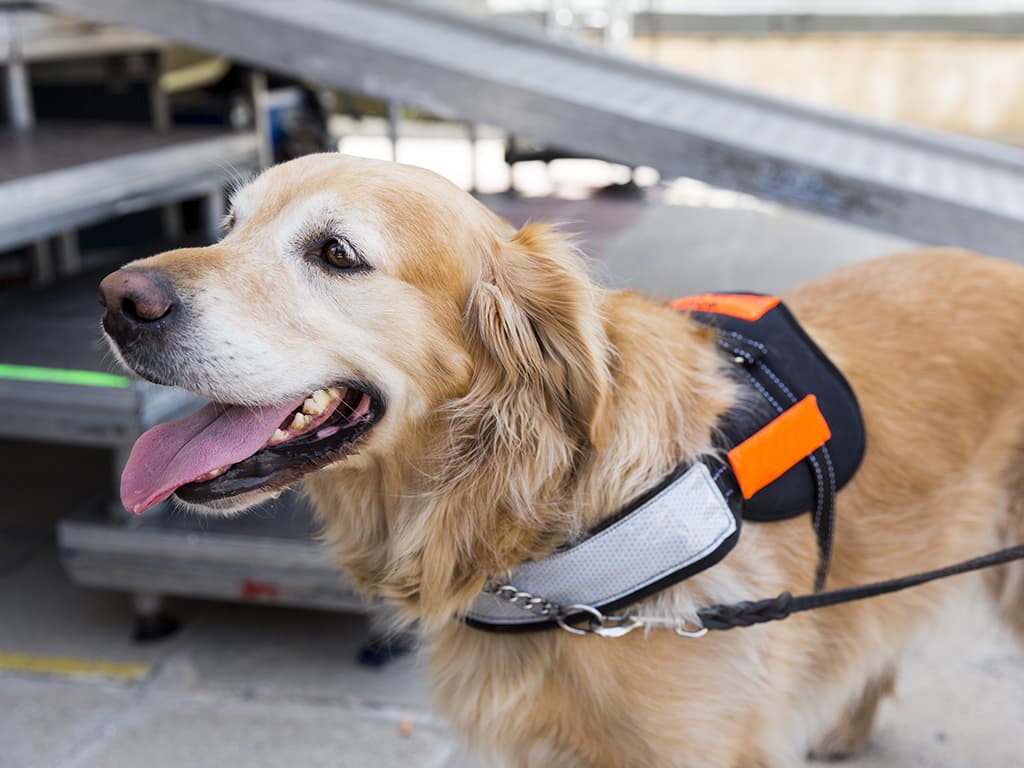- You are here:
- Home »
- Blog »
- ALS Care »
- How Service Dogs Can Help ALS Patients

How Service Dogs Can Help ALS Patients
Individuals diagnosed with amyotrophic lateral sclerosis (ALS) will face many challenges as the disease progresses. ALS affects all nerves in the body which leads to a gradual and destructive loss of muscle strength. This means that those affected can lose the ability to walk and have difficulty with many daily tasks that most of us take for granted.
There are numerous ways in which support can be provided for people who have been diagnosed with ALS. This includes medication to help slow down the progression of the disease and supportive therapies, such as physiotherapy, which can allow the diagnosed individual to retain their strength and mobility for as long as possible.
Following an ALS diagnosis, working with an occupational therapist can also help the individual to find solutions to daily living problems that might arise as mobility becomes increasingly limited.
One type of support that has proved beneficial for individuals diagnosed with ALS is the use of service dogs.
Here we take a look at the potential an intelligent four-legged friend can offer, how they can help with daily living and also the many things to consider before opting for a service dog.
What are Service Dogs?
Service dogs, also known as assistance dogs, are trained from a young age to provide support for people with a variety of medical needs. Perhaps the most well known of all service dogs is the guide dog, which is specifically trained to help those with visual impairments.
The main purpose of any service dog is to help their owner to regain or maintain their independence. These dogs are highly intelligent animals and they can be trained to do a variety of tasks such as fetching medication, turning on lights and alerting neighbors if there is a problem.
How a Service Dog Can Help an Individual Diagnosed with ALS

An ALS service dog can provide specific support for an individual to help them with daily living. They act as more than just a companion. Someone with ALS will find their muscle strength and balance affected as the disease progresses and this requires a good deal of support.
Below are just a few ways in which a service dog can help an individual diagnosed with ALS.
Assisting with Wheelchairs
If the individual has to use a wheelchair, a service dog can be trained to assist in a number of ways. They could help in getting up ramps by pulling the wheelchair and even assist the owner getting in and out of the chair by providing physical support.
Retrieving Objects
An ALS service dog will be able to assist with a variety of tasks around the house. They can be trained to bring medication to their owner, answer the door and even switch lights on and off. They can also help to notify people nearby if a serious problem arises.
Help with Balance
A service dog can help their owner to maintain balance and improve mobility. They can also help to encourage the individual to get out and about and become more active, rather than being cooped up at home all the time.
Health Benefits
In addition to the practical side of things that a service dog is able to provide, there are numerous personal health benefits. Having a dog has been shown to reduce medical issues such as high blood pressure.
The companionship that an animal like this provides should also not be underestimated.
People with a chronic illness like ALS often suffer from mental health issues such as anxiety and depression. A service dog will certainly help soften the impact of living with uncertainty and promote a sense of calm within their owner.
Things to Consider Before Getting a Service Dog
An ALS service dog is not for everyone and there are some things that should be considered before taking one on.
Whilst they are there to help with daily living, they are also animals that have to be looked after as well. This includes feeding them and taking them to the vet when necessary. They also need to exercise regularly. Ideally, they should live in a home that is big enough for the dog and a yard where they can go outside and keep active. The owner needs to be able to care for the pet, or have someone at home who can help with this.
Most providers of service dogs say that it’s better for them to be the only pet in the house, so this is something that needs to be considered.
The financial cost of buying and owning a service dog should also be considered in advance. There are some agencies which will supply a dog for free, depending on the individual’s circumstances, but it can cost as much as $1,000 to $3,000 for a trained service dog.
It’s important to apply for a service dog sooner rather than later once an individual has been diagnosed with ALS. This gives time for the two to get to know each other and get into a routine.
It’s a good idea to talk with an occupational therapist to see if having a service dog is going to provide the benefits the individual is looking for and to explore all the pros and cons of getting one.
